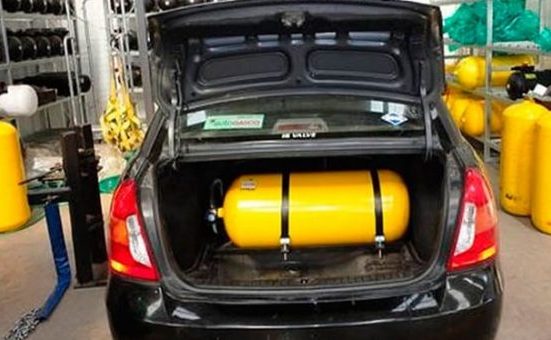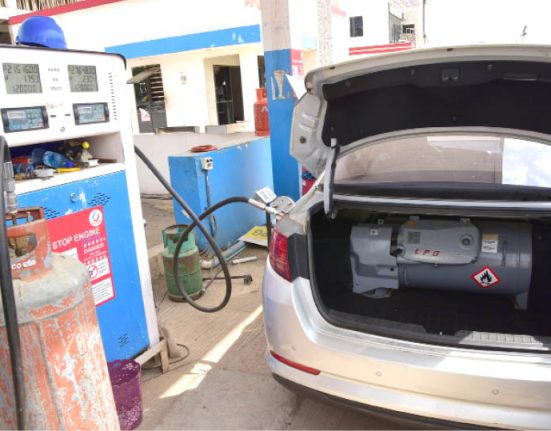Nigeria’s bold transition to cleaner transportation alternatives has recorded a major milestone, as the Presidential Compressed Natural Gas Initiative (PCNGI) announced that over 50,000 vehicles have already been converted to run on Compressed Natural Gas (CNG), with investments in the sector now exceeding $500 million.
The Programme Director and Chief Executive of the PCNGI, Michael Oluwagbemi, disclosed this in a statement issued on Monday, while reacting to media reports that claimed the rollout of CNG infrastructure was slow and underwhelming. He dismissed the claims as misleading, stating that they failed to capture the significant strides made within just one year of the initiative’s implementation under the administration of President Bola Ahmed Tinubu.
According to Oluwagbemi, the PCNGI, which officially kicked off in May 2024, has led to the establishment of 255 new vehicle conversion centres and 53 daughter CNG dispensing stations across the country. In addition to transforming transportation, the programme has created more than 10,000 direct jobs and is driving growth in a previously untapped sector.
He recalled that prior to the renewed push under President Tinubu’s leadership, the adoption of CNG in Nigeria was minimal, with only 11 functional stations in existence, mostly remnants of a pilot scheme introduced by the Nigerian National Petroleum Company Limited (NNPCL) in 2017. Public interest in CNG was low, with misinformation and scepticism clouding perceptions of its viability.
The PCNGI boss said the initial task of the initiative was to address public doubts and misinformation through an extensive awareness campaign that ran from May to October 2024. At the time, fewer than 4,000 vehicles were running on CNG, and the limited infrastructure could not meet demand. However, through targeted incentives and strategic partnerships, the sector has grown rapidly, with more Nigerians embracing the economic and environmental benefits of CNG.
Oluwagbemi emphasised that the transformation within a single year is not only remarkable but unprecedented in Nigeria’s energy history. “Today, we have over 50,000 vehicles already converted, with projections to double that number soon. Naturally, demand is increasing, and queues at CNG stations will grow—this is a sign of progress, not failure,” he noted.
Private sector operators have been at the forefront of this expansion. In Abuja, two new daughter stations were recently inaugurated by AY Shafa and Femadec, who are targeting a combined rollout of 30 more stations over the next 12 months. Femadec is also collaborating with 20 universities to develop CNG ecosystems on campuses. Greenville, another major investor, is establishing 51 Liquefied Compressed Natural Gas stations across the North and South-East regions, including underserved areas such as Yola. Other cities like Port Harcourt, Ado-Ekiti, Lokoja, Aba, Enugu, and Abuja are also expected to see new station activations in the coming months.
Oluwagbemi also pointed to Ilorin as a model example of how local economies can benefit from CNG infrastructure, noting that the success there is being replicated nationwide. NNPCL, he said, is scaling up its involvement, increasing its CNG stations from 12 to 20 in the current phase, with 40 more planned in the next rollout. Bovas is also setting up modern stations in Ibadan, while NIPCO is preparing to add eight new sites to its 23 already operational.
In a further vote of confidence for the sector, the Midstream and Downstream Gas Infrastructure Fund has recently awarded equity financing to 10 project developers, three of which are focused on CNG station development. This comes on the back of an earlier ₦123 billion investment made by the fund in 2024.
Despite these achievements, Oluwagbemi urged Nigerians to remain patient and realistic, noting that large-scale transitions in national energy consumption patterns cannot occur overnight. “It took more than 70 years for Nigeria to become heavily dependent on petrol and diesel. Reversing that trend in just seven months is unrealistic, but the pace of progress is impressive by any global standard,” he said.
He criticised recent media portrayals of the programme as uninformed, stressing that Nigeria’s current momentum in the CNG sector is undeniable. He questioned the logic behind reverting to petrol-only vehicles when bi-fuel vehicles are delivering up to 90 per cent cost savings in some cases.
Reaffirming the federal government’s commitment to alternative energy, Oluwagbemi stated that the PCNGI is fully aligned with President Tinubu’s Renewed Hope Agenda, and remains dedicated to working across the CNG value chain to deliver on promises made to Nigerians. As investment continues to pour in and infrastructure expands, Nigeria appears poised to become a regional leader in natural gas-powered mobility.







